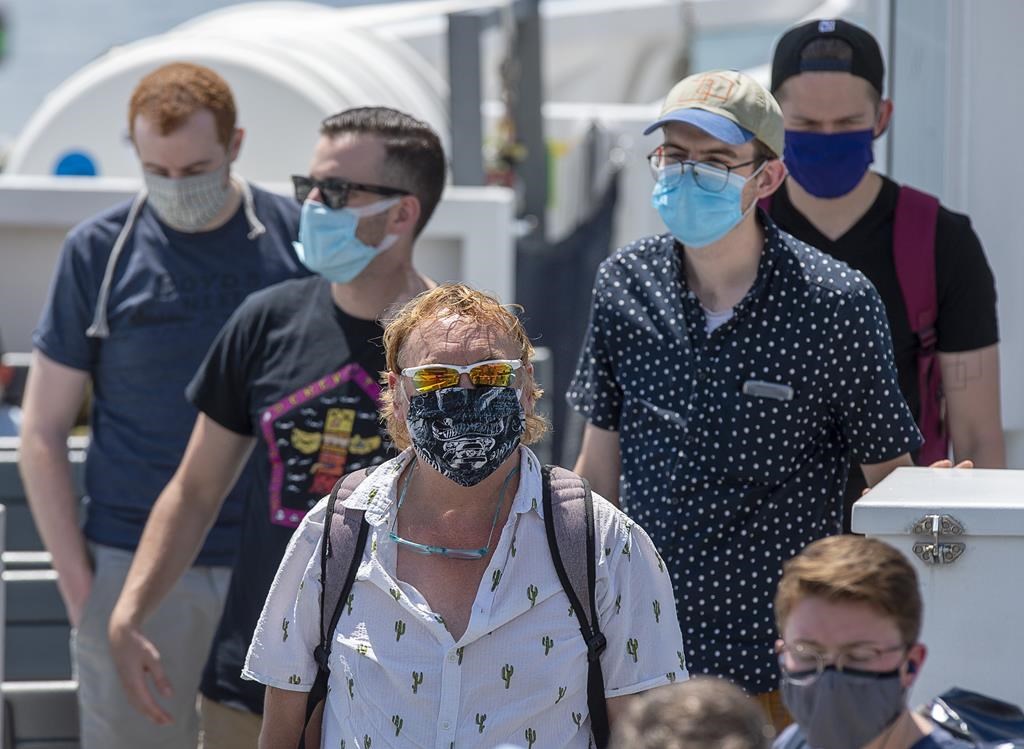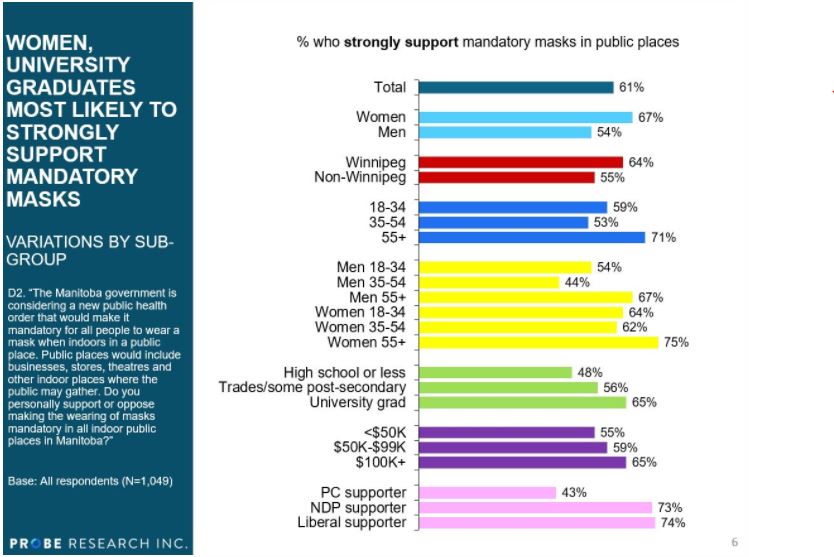More than eight-in-ten Manitobans support the idea of making face masks mandatory in public spaces, according to a poll released Wednesday, including six-in-ten who “strongly” support the idea.

The authors of the poll, done by Probe Research Inc., point out there is considerable overlap between those who support a mask mandate, those who say they already regularly wear one regularly, and those who are comfortable with others wearing masks.
They are women – especially those over age 55 – Winnipeggers, and those with higher levels of education.
“I think it’s really positive that people are supportive of the mandatory mask laws and understanding that we need to work together to stop the chain of transmission,” says Cynthia Carr, epidemiologist and founder of EPI Research Inc., which helped put together the poll.
“When something is mandatory sometimes that sounds like a bad thing, but it’s also more clear … and then we kind of avoid uncertainty and listening to different pieces of information.”
A full one-in-ten say they never wear a mask already, alongside 20 per cent who do, but rarely.
The top reasons given for not wearing a mask were because they’re either too uncomfortable (49%) or because they won’t protect oneself from COVID-19 or prevent the spread (48%).
Carr says early public health information may be responsible for those perceptions.

Get weekly health news
“You know the expression: you never get a second chance to make a first impression. That first impression sticks,” Carr says.
“So what we said in the beginning was people should not be wearing masks unless they’re health care workers because we wanted to save our PPE (personal protective equipment), and also that the mask was meant for people who are sick to prevent the spread to others.”
She adds that while those factors remain, the medical community has since learned about the asymptomatic transmission of the virus.
Dr. Amy Tan is an associate professor of family medicine at the Cumming School of Medicine and the University of Calgary and with the group Masks4Canada, and was surprised by the statistics coming out of Manitoba.
“I think it’s actually higher than the national average, which the last time I looked a couple weeks ago was more in the 60 to 70 per cent of Canadians across the country being O.K. with mask mandates,” Dr. Tan says.
“I think it’s interesting … because that means they want the clear messaging from either the province or public health that everybody is on the same page. And I think that really speaks to perhaps encouraging the government to act on that.”
Despite the high rate of mask acceptance revealed in the study, only one-in-three say they always do when out and about.
Dr. Tan says that may reflect peoples’ concern with finding themselves in the minority.
“What we have found in other jurisdictions that my group, Masks4Canada, has helped with with regards to mask mandates is that the next day compliance and adherence to mask mandates shoots up to 80 to 90 per cent where previously it was 10 to 20 per cent.”
Most Manitobans are comfortable with others wearing masks (84%), the poll shows, with half saying it makes them “very” comfortable.
For those who aren’t comfortable, one-quarter say it’s because they can’t see people’s faces. 16 per cent say it’s because masks don’t work or aren’t used properly, followed by those who view it as a form of social control (13%).
Another interesting disparity among those who support a mask mandate is the political divide.
Only four-in-ten PC supporters are likely to support such a move, compared to three-quarters of both NDP and Liberal supporters.
“I would say that is both surprising and something that we probably need to look more deeply at the data about,” Carr says.
“Even the World Health Organization in their pandemic planning documents talk about one of the biggest challenges to infectious disease control is trust in government and trust in leadership.”
Dr. Tan suspects the stark political divide and politicization of the pandemic happening in the United States has bled over into Canadian culture.
“It’s unfortunate,” Dr. Tan says.
“Because this is not a partisan issue, this is a human being issue. We’re all human beings regardless of our political ideology or beliefs, so unfortunately I think we are seeing the effects of anti-science and misinformation about the virus filtering up.”
The survey of 1,049 adults in Manitoba took place between August 19th and 29th, 2020.














Comments